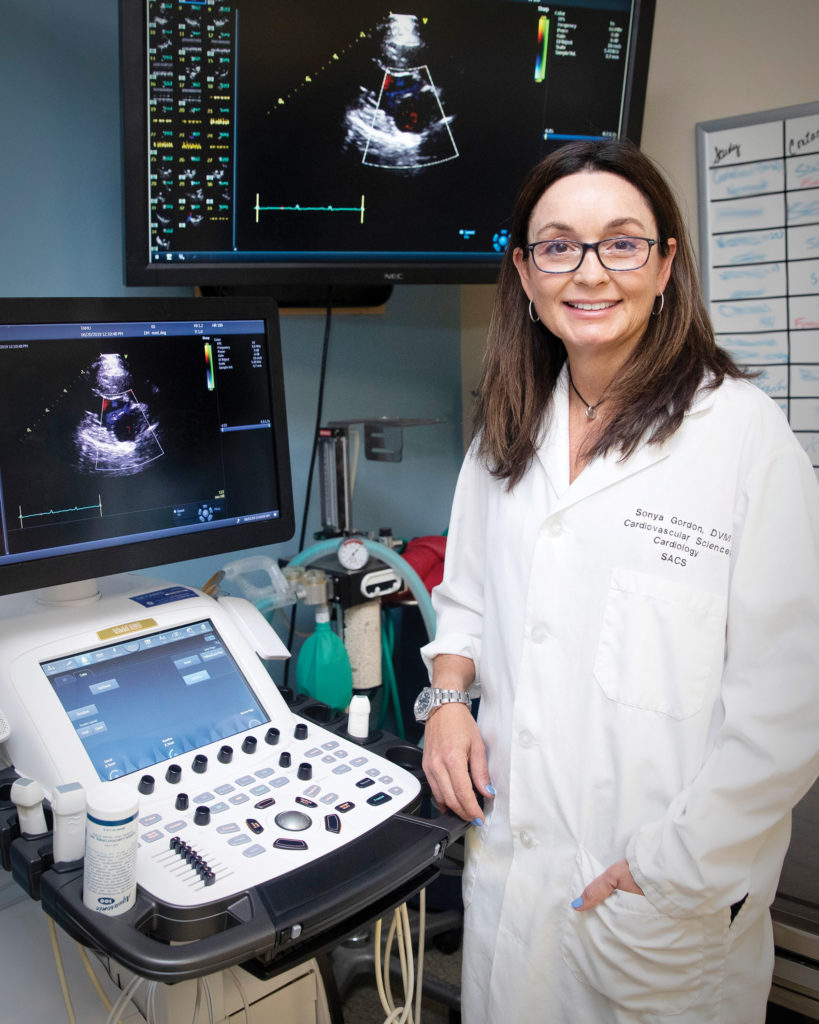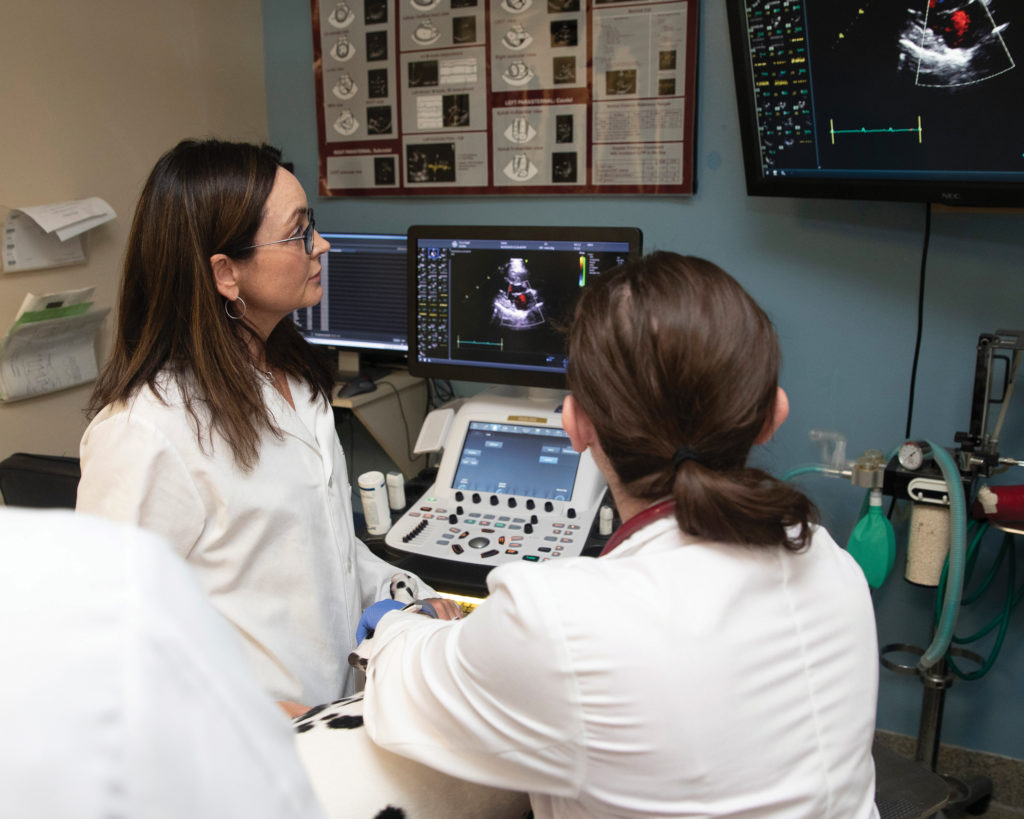Clinical Trials: Cardiology
The cardiology clinical trials Dr. Sonya Gordon leads are helping to solve some of the biggest issues with the canine heart, while creating tools veterinarians can use to treat patients better—and more cost-effectively.

For Texas A&M College of Veterinary Medicine & Biomedical Sciences (CVM) cardiologist Sonya Gordon, the adage “the greater the risk, the greater the reward” has become something of a philosophy that drives her approach to clinical trials.
That’s because as she works to solve some of the biggest issues in canine cardiology, the clinical trials she is involved with often work with some of the sickest patients.
But the impact of her work so far has been…well, epic.
For example, in the recently completed EPIC trial, Gordon helped identify an effective treatment for canine mitral valve disease (MVD), a condition characterized by the degeneration of the mitral valve. MVD accounts for more than 75 percent of all canine heart disease and ultimately leads to heart failure in many dogs.
The EPIC study findings—which have been deemed “revolutionary”—demonstrated that the drug pimobendan effectively delays the onset of clinical signs of MVD and extends overall survival.
Gordon and the other two lead investigators are now working on the third and final manuscript for that study. The original and second manuscripts were both recognized with awards for receiving some of the most downloads in the 12 months following online publication, indicating the immediate impact and visibility the work generated, as well as the significant contributions the study made to the advancement of the field.
“Perhaps the most important impact of the EPIC study is the change in the revised American College of Veterinary Internal Medicine consensus statement guidelines for the treatment of canine valvular disease,” Gordon said. “The EPIC study results led to the refinement of the staging criteria for the disease and a strong evidence-based recommendation for the initiation of pimobendan when dogs’ hearts meet the size criteria used in the EPIC study.
“The publication of the new updated consensus statement will continue to impact the incorporation of the EPIC study results into practice around the world, resulting in dogs being well longer.”
Building on that momentum, Gordon is involved in two current clinical trials that focus on specific breeds that experience very serious cardiac issues—Doberman Pinschers and Cavalier King Charles spaniels.
Her clinical trial with Doberman Pinschers is among the first gene transfer studies for pets. The work Gordon did with the U.S. Food and Drug Administration before the trial even began will build a pathway for other pet gene therapy projects, a contribution in and of itself.

Collaborating with Drs. Paul A. Grayburn and Chen Shuyuan, at the Texas A&M College of Medicine and Baylor University Medical Center, Gordon and her resident, Blakeley Janacek, are exploring a minimally invasive way to deliver a gene that potentially has regenerative properties that may lead to strengthening the heart in Dobermans with dilated cardiomyopathy, a disease that causes the heart muscle to enlarge and become weak.
“As many as 60 percent of Dobermans will get this disease in their lifetime; it’s that common in the breed,” Gordon said. “And it is a relentlessly progressive disease once they have it. We know a medication (pimobendan) can slow down the progression, but the reality is that when the heart is so tired and sick, what it really needs is, ideally, regeneration.”
In piloting this trial, Gordon and Janacek have enrolled three dogs and are actively looking for seven more. Because dilated cardiomyopathy is such a devastating disease, the dogs with which they are working are extremely sick—the literature indicates that the median survival is three weeks once a dog is in heart failure, though Gordon’s experience has been that they may live for up to six months.
“We’re still in the learning phases of the study, for sure, but we’ve had some promising short-term results,” she said.
In the second clinical trial, Gordon and her CVM cardiology colleagues Dr. Ashley Saunders and Dr. Sonya Wesselowski are examining blood samples, chest radiographs, echocardiograms, electrocardiograms, and heart sounds, collected with an artificially intelligent stethoscope, from 300 healthy Cavalier King Charles spaniels of all ages that have heart murmurs.
The study’s goal is to build a prediction model that will help primary care veterinarians identify when pimobendan should be initiated (like with the EPIC study) when an echocardiogram is not available. Currently an echocardiogram is considered the best test, but it can be expensive and is not always available.
While not all of Gordon’s projects are translational, her Doberman project does have potential implications for humans, and Gordon hopes her project offers the first step toward helping both human and veterinary patients.
“One goal of managing heart disease in animals is to identify it early and find ways to delay progression, especially in the early preclinical stage, so they can die with heart disease but not from it,” Gordon said. “We really hope to find ways to provide veterinarians out in the field with the tools they need so they can do what they need to do. That’s how we raise the bar of veterinary care.”
###
Note: This story originally appeared in the Fall 2019 edition of CVMBS Today.
For more information about the Texas A&M College of Veterinary Medicine & Biomedical Sciences, please visit our website at vetmed.tamu.edu or join us on Facebook, Instagram, and Twitter.
Contact Information: Jennifer Gauntt, Director of CVMBS Communications, Texas A&M College of Veterinary Medicine & Biomedical Sciences; jgauntt@cvm.tamu.edu; 979-862-4216



